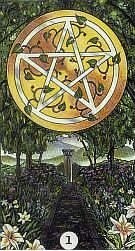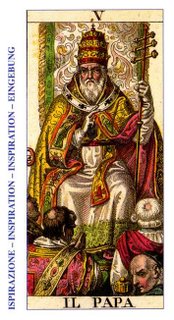 There's something about this guy that just makes me go, "Awwwwww!" He's so sweet. He reminds me of my son, Josiah, when he was a little boy. Josiah would pat my knee and say, "I neeeed a hug," several dozen times a day. If scolded for wrongdoing he would blink tears away from those deep brown eyes and just look so wounded that you just had to hug him even if you were angry with him. He's now 13 years-old and still as sweet and sensitive. (I'm sure he would just cringe if he heard me say that.) There is a soft innocence to the Page of Cups that can melt your heart.
There's something about this guy that just makes me go, "Awwwwww!" He's so sweet. He reminds me of my son, Josiah, when he was a little boy. Josiah would pat my knee and say, "I neeeed a hug," several dozen times a day. If scolded for wrongdoing he would blink tears away from those deep brown eyes and just look so wounded that you just had to hug him even if you were angry with him. He's now 13 years-old and still as sweet and sensitive. (I'm sure he would just cringe if he heard me say that.) There is a soft innocence to the Page of Cups that can melt your heart.I chose the Housewives Tarot Page of Cups not only because he brings a smile to my face...how could he not? Look at him!...but also because it portrays the elemental combination of this Page very nicely. Pages are represented by the earth element and this Page, being of the suit of cups, is of water. Therefore, the Page of Cups is known as "earth of water." Here, the Page is shown watering flowers with the faces of his loved ones on them and beneath the earth are heart shaped roots. He is barefoot in the dirt and his trousers are muddied. He clearly receives a lot of pleasure from expressing his feelings with those he loves and feels very at home in doing the earthly, tangible things that show his affections. He doesn't just talk about how he feels, he demonstrates his feelings with acts of service and gifts. His naivete is usually charming, and his gifts may be things like, "I was taking a walk and thinking about you and I picked up this really pretty rock for you." His gifts are often handmade and very thoughtful. He spends so much time on them, making them just so, thinking of the recipient of his handiwork the entire time.
When this Page appears in a reading he could be showing you a side of yourself that clings to romantic or idealized notions. He can come as a warning this way to guard your sensitive heart and be aware that not everyone shares your feelings about the subject at hand. Conversely, as advice, the Page of Cups may be encouraging you to be a bit more playful in your approach, NOT take things so seriously, indulge in a bit of romantic fantasy and play, let your inner child out and see things, emotionally, with fresh eyes. He may also be hinting that you might want to show those in your life how you feel about them with a tangible display of your feelings with a heartfelt gift maybe.
As a messenger, the Page of Cups may herald a new love or friendship, a relationship that engages your heart and which brings new emotional energy to your life. Traditionally it is said that the Page of Cups may bring news of a baby, a new birth, but personally I have not seen this evident in my own readings. I can see how he could, but I usually see him coming to bring messages of an emotional nature, and not that a baby announcement is not emotional, it is, but the kinds of messages I have seen him deliver are more along the lines of, "I miss you!" or "I thought you could use cheering up today," with a plate of your favorite muffins.
There is very little that is inherently negative about the Page of Cups except her tendency to get hurt easily. That's not her fault, really. She hasn't, and likely won't develop the tough shell of a crab to defend herself. In many decks her companion is a fish which symbolizes the spiritual, intuitive nature of this Page and her ease with emotions. However, when upset this Page can become tiresome with her tears and frequent need to be treated with kid gloves. Sometimes they can exasperate you and you just want to shake them and say, "Get real!" or "Knock it off!" But then you feel like a total louse because they give you that wide-eyed look that says, "How could you do that to me? Why did you?" More than likely you'll then not only be patting their heads about whatever it was that upset them in the first place, but now also profusely apologizing for being insensitive yourself. Tiptoeing around their feelings can be difficult at times, but given the resiliance of their youthful outlook, these phases of melancholy usually do not last long, thank goodness.
The Housewives Tarot Copyright 2004 by Paul Kepple and Jude Buffum. Published by Quirk Books.
DruidCraft TarotCopyright 2005 Philip Carr-Gomm, Stephanie Carr-Gomm, Will Worthington. Published by St. Martins Press





































